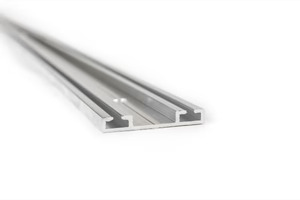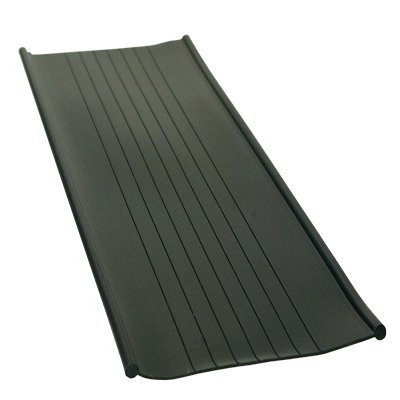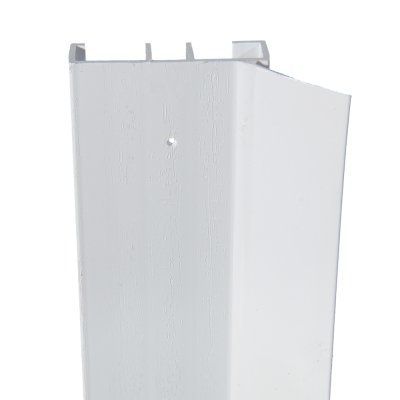What’s the unsung hero of your garage, working tirelessly to keep the elements at bay and your energy bills in check? It’s your garage door seal! But with so many options on the market, how do you know which one is right for you?
This guide breaks down popular garage door seal types, helping you make an informed decision and give your garage the protection it deserves.
Why garage door seals matter
Before going through the specifics, let’s understand why a good garage door seal is crucial. Here are some key benefits:
- An adequately sealed garage door prevents energy loss, keeping your garage cooler in the summer and warmer in the winter. This translates to lower energy bills and a reduced carbon footprint.
- A good seal keeps out rain, snow, dust, and debris, protecting your belongings and preventing damage to your garage.
- A sealed garage deters pests like rodents and insects from entering your home.
- A quality seal can help dampen noise from outside, creating a quieter and more peaceful environment inside your home.
Now that you understand the importance of a good garage door seal, let’s explore the available types.
Common types of garage door bottom seals
Choosing the right bottom seal can feel overwhelming, given all the options available. But don’t worry—we’re here to simplify things. Let’s break down the most common types, highlighting their unique features and benefits to help you find the perfect fit for your garage door.
1. T-Style Seals
T-style seals, named for their “T” shaped cross-section, are a common and reliable choice for garage doors. They’re typically made from durable rubber or vinyl and slide into a track on the bottom of the garage door. The “T” forms a tight seal against the floor when the door closes.
Pros Cons Durable and long-lasting Can be more expensive than other options Effective against drafts, water, and pests May require professional installation Works well on uneven floors Can be stiff in extremely cold weather Available in various sizes and materials
Here’s why T-style seals are a great option:
- Built to last: Made from tough materials, T-style seals hold up well against wear and tear, sun exposure, and extreme temperatures. This means you won’t have to replace them as often as other types.
- Superior sealing: The design of the “T” allows it to conform to minor imperfections in your garage floor, creating a tight seal that keeps out the elements, critters, and debris.
- Versatility: You’ll find T-style seals in various materials, including vinyl, rubber, and even aluminum, allowing you to choose the best fit for your climate and garage door.

However, keep in mind:
- Installation: While some homeowners may tackle this themselves, installing a T-style seal often requires some experience and the right tools. For the best results, you may want to consider professional installation.
- Cost: Expect to pay a bit more for T-style seals compared to simpler options like bulb seals. However, their durability and performance often make them a worthwhile investment in the long run.
- Cold weather performance: The rubber or vinyl can become stiff in extremely cold climates, potentially affecting the seal. However, choosing a seal made with cold-resistant materials can minimize this issue.
2. Bulb Seals
Bulb seals, or “bead” seals, get their name from their distinctive rounded shape. When the garage door closes, the bulb compresses, forming a tight seal against the floor. They are typically made from vinyl or rubber and are popular for their affordability and ease of installation.
Pros Cons Affordable Not as durable as other options Easy to install Can be less effective on uneven floors Effective against drafts, dust, and water May need frequent replacing Available in various sizes
Let’s dig deeper into why you might choose a bulb seal:
- Cost-effective: Bulb seals are generally the most budget-friendly option. If you’re looking for a simple and affordable solution, these are a great starting point.
- DIY installation: You can easily install most bulb seals yourself with minimal tools. This can save you money on professional installation costs.
- Good for moderate climates: A bulb seal can provide adequate protection from the elements if you don’t experience extreme temperatures or heavy rainfall.
However, consider these points:
- Durability: While they do the job, bulb seals are generally less durable than other types, especially in harsh weather conditions. The material can crack or become brittle over time, requiring more frequent replacement.
- Uneven floors: If your garage floor has significant cracks, slopes, or unevenness, a bulb seal may not create a complete seal, allowing water, pests, and debris to enter.
3. Beaded Seals
Beaded seals are a close relative of bulb seals, but with a key difference: a more pronounced “bead” or rounded edge. This design provides a firmer seal against the garage floor, making them a step up in protection compared to standard bulb seals. Like their bulb counterparts, they’re usually made from vinyl or rubber and are relatively easy to install.
Pros Cons More durable than standard bulb seals Can be more expensive than bulb seals Provide a tighter seal May not be suitable for very uneven floors Effective against drafts, dust, and water Can wear down over time Available in various sizes
Why might you choose a beaded seal?
- Enhanced sealing: That pronounced bead creates a stronger seal against your garage floor, offering better protection against drafts, water, and even small pests.
- Increased durability: While not as robust as other options, beaded seals generally offer better longevity than standard bulb seals.
- Easy installation: Just like bulb seals, beaded seals are relatively easy to install yourself, saving you the cost of professional installation.

But here are a few things to consider:
- Cost: Beaded seals typically cost a bit more than basic bulb seals. However, the added protection and durability often make them a worthwhile investment.
- Floor condition: While the bead provides a good seal, it may not be the best choice for garages with significantly uneven floors. In those cases, you might need a seal that can conform to larger gaps and imperfections.
- Lifespan: While more durable than bulb seals, beaded seals can still wear down over time, especially with exposure to extreme temperatures or heavy use.
4. U-Shaped Seals
U-shaped seals, also known as “channel” seals, live up to their name with a distinct “U” profile. This design allows them to grip the garage floor firmly, creating a comprehensive seal against drafts, water, and debris. Typically made from durable materials like EPDM rubber or vinyl, they offer a balance of performance and affordability.
Pros Cons Excellent sealing capabilities Can be more challenging to install Effective against drafts, water, and pests May not be ideal for extremely uneven floors Durable and long-lasting Can be stiffer than bulb seals Available in various sizes and materials
Why consider a U-shaped seal?
- Superior sealing: The “U” shape creates a snug fit against the garage floor, forming a barrier against even the smallest gaps. This makes them highly effective at keeping out the elements, pests, and debris.
- Durability: U-shaped seals are designed to withstand wear and tear, making them a good long-term investment. They hold up well against weather, temperature fluctuations, and regular use.
- Versatility: U-shaped seals are available in various materials to suit your needs and climate. EPDM rubber is a popular choice because it is highly resistant to weather and temperature extremes.
However, it’s important to note:
- Installation: Installing U-shaped seals can be trickier than installing simpler options like bulb seals. They often require precise fitting within a garage door retainer track. For optimal results, you might want to consider professional installation.
- Floor conditions: While U-shaped seals offer excellent sealing, they might not be the best choice for garages with severely uneven floors. In those cases, a more flexible seal may be necessary to conform to the floor’s contours.
- Stiffness: Compared to bulb seals, U-shaped seals can be slightly stiffer, especially in cold weather. However, this stiffness contributes to their strong sealing capabilities.
5. Vinyl Seals
Vinyl seals are popular for their affordability, ease of installation, and effectiveness in sealing out the elements. These seals are made from durable vinyl, a synthetic plastic known for its resistance to moisture, chemicals, and UV damage. They come in various profiles, including bulb, beaded, and U-shaped, offering versatility for different garage door needs.
Pros Cons Affordable and readily available Can become brittle in extreme cold Easy to install May not be as durable as rubber options Resistant to moisture and UV damage Can crack or tear with heavy use Good for moderate climates
Why choose vinyl seals?
- Cost-effective: Vinyl seals are generally budget-friendly, making them an attractive option for homeowners seeking an economical solution.
- DIY installation: Many vinyl seals are designed for easy installation, allowing you to tackle the project yourself and save on professional installation costs.
- Weather resistance: Vinyl’s inherent properties make it resistant to moisture, sunlight, and temperature fluctuations, making it suitable for various climates.

However, consider these points:
- Temperature sensitivity: While vinyl performs well in moderate climates, it can become brittle and crack in extremely cold temperatures.
- Durability: Compared to rubber seals, vinyl seals may have a shorter lifespan, especially with heavy use or exposure to harsh conditions.
- Limited flexibility: Depending on the specific profile, some vinyl seals may have limited flexibility, making them less effective on uneven floors.
6. Rubber Seals
Rubber seals are a top choice for garage doors thanks to their exceptional durability and sealing capabilities. Made from various types of flexible rubber, including EPDM, neoprene, and silicone, they offer superior resistance to the elements, temperature fluctuations, and wear and tear. You’ll find rubber seals in various profiles like bulb, beaded, U-shaped, and T-style, providing options for different needs and preferences.
Pros Cons Highly durable and long-lasting Can be more expensive than vinyl Excellent resistance to weather and UV May require stronger adhesives Effective against drafts, water, and pests Some types can be bulky Available in various profiles and sizes
Why choose a rubber seal?
- Longevity: Rubber seals are known for their exceptional durability. They can withstand extreme temperatures, harsh weather conditions, and frequent use, making them a long-term investment for your garage door.
- Superior sealing: Rubber’s inherent flexibility allows it to conform to minor imperfections in the garage floor, creating a tight seal that effectively blocks out drafts, water, and pests.
- Variety: Rubber seals come in various profiles, each with its own advantages. You can choose the profile that best suits your garage door and floor conditions.
However, keep in mind:
- Cost: Rubber seals generally cost more than vinyl seals. However, their superior durability and performance often justify the higher price.
- Adhesive requirements: Some rubber seals may require stronger adhesives for secure installation.
- Bulk: Certain rubber profiles, like large U-shaped or T-style seals, can be bulky and may require more clearance space beneath the garage door.
Choosing the Right Seal
Selecting the perfect garage door bottom seal for your needs involves considering several key factors. By assessing these aspects, you can ensure a snug, secure, and long-lasting seal that protects your garage and belongings.
Here’s what to keep in mind:
- Climate: Do you live in an area with extreme temperatures, heavy rainfall, or strong winds? If so, you’ll need a durable seal to withstand these conditions. Rubber seals, particularly EPDM or neoprene, are excellent for harsh climates.
- Garage Floor Condition: Is your garage floor level, or does it have cracks, slopes, or unevenness? For uneven floors, choose a seal with good flexibility, such as a bulb seal or a U-shaped seal with a flexible material.
- Garage Door Material: The material of your garage door can influence your seal choice. For example, a heavy wooden door may require a more robust seal than a lightweight aluminum door.
- Frequency of Use: How often do you open and close your garage door? If you use it frequently, opt for a durable seal that can withstand regular wear and tear. Rubber or T-style seals are good options for high-traffic garages.
- Desired Level of Protection: What are you hoping to achieve with your bottom seal? Are you primarily concerned with keeping out drafts, water, pests, or above? Different seals offer varying levels of protection. Consider a U-shaped or T-style seal made from durable rubber for maximum protection.
- Budget: Garage door bottom seals come in a wide price range. Determine your budget beforehand to narrow down your options. While vinyl seals are generally the most affordable, rubber seals offer greater longevity and performance.
- DIY vs. Professional Installation: Are you comfortable installing the seal yourself, or would you prefer to hire a professional? Consider your DIY skills and the seal installation’s complexity before deciding.
By carefully evaluating these factors, you can confidently choose the ideal garage door bottom seal to meet your needs and provide long-lasting protection for your garage.
Tired of Drafts, Pests, and Water in Your Garage?
Don’t let your garage door bottom seal let you down! A worn-out or ill-fitting seal can lead to drafts, water damage, and even unwanted pests.
At Doorvana, we provide expert garage door weatherstripping services, including installing high-quality bottom seals tailored to your needs and budget. Our experienced technicians will ensure a perfect fit, keeping your garage protected from the elements and saving you money on energy costs.
Schedule your free consultation today and say goodbye to garage door woes!
Conclusion
Choosing the right garage door bottom seal is crucial in maintaining a secure, comfortable, and well-protected garage. By understanding the various types of seals available, considering your specific needs, and investing in a quality product, you can enjoy the benefits of a well-sealed garage door for years to come. Whether you prioritize affordability, durability, or ease of installation, there’s a perfect seal out there waiting to enhance your garage door’s performance and safeguard your valuable belongings.
FAQs about garage door bottom seals
How do I know if my garage door seal needs replacing?
Look for these signs:
- Visible cracks, tears, or damage to the seal.
- Drafts, water, or pests entering your garage.
- Increased energy bills due to poor insulation.
- The seal is no longer flexible or has become brittle.
- You can see daylight through the gaps when the door is closed.
Can I install a garage door seal myself?
Yes, many garage door seals are designed for DIY installation. However, some types, like T-style seals, may require professional installation for optimal results. If you’re unsure, it’s always best to consult with a garage door professional.
How do I maintain my garage door seal?
- Regularly clean the seal with a mild detergent and water to remove dirt and debris.
- Inspect the seal for signs of wear and tear and replace it as needed.
- Lubricate the seal with a silicone-based lubricant to keep it flexible and prevent cracking.
- Avoid parking too close to the garage door, damaging the seal.
How much does it cost to replace a garage door seal?
The cost varies depending on the type of seal, the size of your garage door, and whether you hire a professional for installation. Generally, you can expect to pay anywhere from $20 to $100 for the seal itself, and professional installation can add another $50 to $150 to the total cost.
Where can I buy a garage door seal?
Garage door seals are available at most home improvement stores, hardware stores, and online retailers. You can also purchase them directly from garage door manufacturers and installers.

